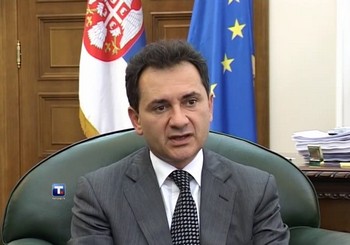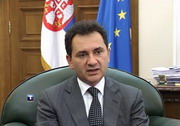Q:
A:
Second quarterly report on implementation of Action plan to be submitted to government by mid-July
Belgrade,
2 July 2011
Deputy Prime Minister for European Integration Bozidar Djelic said today that good cooperation of Serbia with the International Criminal Tribunal for the Former Yugoslavia (ICTY) and the fact that Belgrade has proposed a dialogue with Pristina should contribute to consensus within the EU so that Serbia could get the candidate status at the end of the year and the date for beginning of negotiations for the EU membership.
In an interview for the Tanjug news agency, Djelic said that fulfilment of many elements of the reform agenda, which are also included in the Action plan for the fulfilment of recommendations of the European Commission, and the fact that dialogue with Pristina is underway, whose concrete results are expected in the summer, should contribute to a positive opinion within the EU.
For obtaining the candidate status the only thing that is awaited are the first concrete results of dialogue with Pristina, which we ourselves proposed, and nothing else, he stressed.
Speaking about the ratification of the Stabilisation and Association Agreement (SAA), he stated that it is important that all or almost all EU member states will have ratified this agreement by the end of the year because the country whose SAA is ratified practically becomes an associate member of the EU.
Djelic noted that the decision of the Dutch parliament’s European Affairs Committee to launch the ratification process of the SAA between the EU and Serbia is important for the beginning of negotiations between the EU and Serbia and that it also shows that the “Hague condition“ has been met to a large extent.
Djelic said that so far 17 countries have ratified the SAA, two did it but are yet to send a proof of that to Brussels, and as for France and Finland it is a question of weeks when they will do it as well.
Speaking about the Action plan and recommendations contained in it, Djelic underlined that a lot has been done until the end of March, but that a lot of work is to be done yet.
He explained that the second quarterly report on the realisation of the Action plan will be submitted to the Serbian government by mid-July. Some important laws should be adopted in the near future, such as the law on public property and return of property.
Speaking about other activities envisaged by the Action plan, Djelic said that reform of the judiciary is necessary, as well as adoption of several laws in the field of infrastructure. He underlined that it is important that this work be done during July and August so that it could be taken into account for the next opinion of the European Commission.
He pointed out that some items envisaged by the Action plan, such as fight against corruption, are a very complex process though and that Serbia will not stop working on them even when it obtains the candidate status.
Commenting on the funds that Serbia receives in the pre-accession phase, Djelic recalled that the European Commission presented a proposal for EU budget for the period 2014-2020 and that the amount of money for the EU enlargement is not reduced, contrary to some expectations.
However, a painstaking process of negotiation will be required in this matter, as the United Kingdom pointed out that such a budget proposal is unacceptable.
He concluded that Serbia could get a significant increase of funds once it obtains the candidate status.
For obtaining the candidate status the only thing that is awaited are the first concrete results of dialogue with Pristina, which we ourselves proposed, and nothing else, he stressed.
Speaking about the ratification of the Stabilisation and Association Agreement (SAA), he stated that it is important that all or almost all EU member states will have ratified this agreement by the end of the year because the country whose SAA is ratified practically becomes an associate member of the EU.
Djelic noted that the decision of the Dutch parliament’s European Affairs Committee to launch the ratification process of the SAA between the EU and Serbia is important for the beginning of negotiations between the EU and Serbia and that it also shows that the “Hague condition“ has been met to a large extent.
Djelic said that so far 17 countries have ratified the SAA, two did it but are yet to send a proof of that to Brussels, and as for France and Finland it is a question of weeks when they will do it as well.
Speaking about the Action plan and recommendations contained in it, Djelic underlined that a lot has been done until the end of March, but that a lot of work is to be done yet.
He explained that the second quarterly report on the realisation of the Action plan will be submitted to the Serbian government by mid-July. Some important laws should be adopted in the near future, such as the law on public property and return of property.
Speaking about other activities envisaged by the Action plan, Djelic said that reform of the judiciary is necessary, as well as adoption of several laws in the field of infrastructure. He underlined that it is important that this work be done during July and August so that it could be taken into account for the next opinion of the European Commission.
He pointed out that some items envisaged by the Action plan, such as fight against corruption, are a very complex process though and that Serbia will not stop working on them even when it obtains the candidate status.
Commenting on the funds that Serbia receives in the pre-accession phase, Djelic recalled that the European Commission presented a proposal for EU budget for the period 2014-2020 and that the amount of money for the EU enlargement is not reduced, contrary to some expectations.
However, a painstaking process of negotiation will be required in this matter, as the United Kingdom pointed out that such a budget proposal is unacceptable.
He concluded that Serbia could get a significant increase of funds once it obtains the candidate status.











